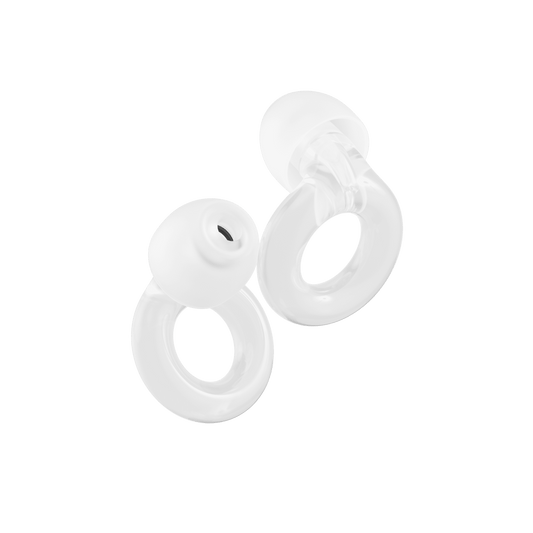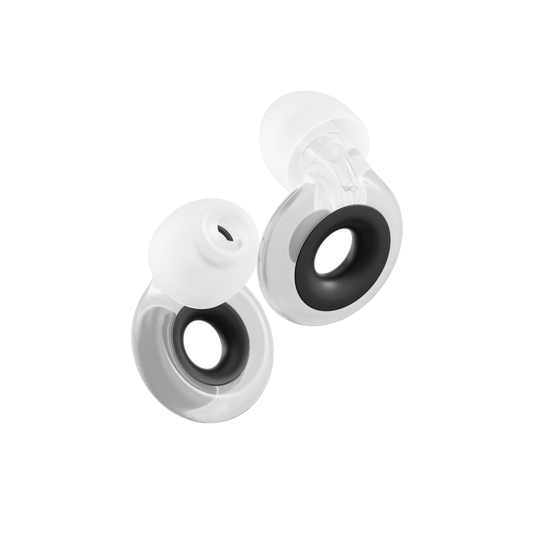Key takeaways:
- It’s common for parents to experience auditory sensory overload, when a person is overstimulated by exposure to noise in their environment
- You might not be able to avoid noise as a parent, but there are things you can do to help manage your emotional responses to it
- Some techniques to manage auditory overload include creating daily routines, scheduling in quiet time, and wearing earplugs to filter out noise
Are you a parent, suffering from auditory sensory overload and looking to find your calm? Or are you sensitive to noise – perhaps even more so now that there’s a whole new world of child-related noise in your life?
While you want to be fully present for your kids, those little rascals sure can be noisy sometimes. Auditory sensory overload in adults is more common than you might think, and it can cause anxiety and irritability. Inevitably, that can mean you’re not as calm as you’d like to be, making parenting even more difficult. As if it’s not hard enough. It can become a vicious cycle.
But there are some things you can do to help drown out the extra noise and manage stress without missing anything – making you a calmer, happier parent.
Understanding auditory overload
Just because parents love their kids with all their hearts, doesn’t mean they love everything that comes with being a parent. There are three main types of sensory overload for parents: auditory, visual and tactile.
Visual overload happens when people struggle to process visual information. Tactile overload happens when someone feels overstimulated through too much touch.
And what about auditory overload? That’s when people’s senses get overloaded by noises. People who are sensitive to noise can get easily overstimulated by loud sounds, or by hearing multiple sounds at once.
For parents this can be a real challenge. Even if you accept noise as part of the package, it can still be difficult and draining to cope with it every day. It can affect your mood, causing anxiety and irritability and making it difficult to stay calm. Loud noises can also sap your energy, leaving you with less to give to others – and you may find it difficult to sleep, which can make your response to loud noises even worse.
Symptoms of sensory overload in parents
Think you might be dealing with auditory overload? Symptoms vary from person to person, but there are some common warning signs that point towards noise sensitivity. Some auditory sensory overload symptoms include:
- Irritability: If you find yourself becoming easily irritated or agitated by sounds that others don’t, or that you didn’t previously find overwhelming, you may be sensitive to noise.
- Fatigue: Auditory overload can be overwhelming. If you’re continually exposed to triggering noises, and you’re trying to deal with your emotional reactions to them while doing your best as a parent, then you might find yourself feeling super tired – even more than is normal for parents!
- Difficulty concentrating: If you’re overstimulated by noise, it can be hard to concentrate on specific tasks or conversations, whether with your kids or other adults.
- Anxiety or stress: Always feel on edge? Always feel like something terrible is going to happen? Do you feel like you can’t relax? It’s no wonder. Auditory sensitivity can trigger our stress responses.
- Headaches: Some people get headaches or migraines if they’re exposed to lots of noise.
How to deal with sensory overload as a parent
Do you recognise these symptoms? Don’t worry, you’re not alone and it’s completely normal to feel this way. There’s nothing wrong with being sensitive to noise: the trick is managing it the best you can. Here are some tips and tricks for better handling auditory overload as a parent.
1. Introduce quiet time
Getting some peace and quiet when you’ve got kids – seems impossible, right? It doesn’t have to be. If you can, create a specific area in your home where you can relax and recharge, even for five minutes.
You’re a better parent when you’re firing on all cylinders, so if you can regularly schedule in some alone time for yourself, it’ll be good for both you and your family. Whether that’s time to go for a walk, get a massage or sit and read a book, it’ll help you to calm your senses and be a better parent. It’s easier to do, of course, if your kids are in school. But if you have babies or toddlers, consider asking friends and family for a little help every now and then. They want to help you be your best self, we promise.
If you don’t have the space, or the opportunity to get away on your own, then think about other ways to introduce quiet time to your household. Can you actively schedule in some time focused on quiet activities like reading or painting, for the whole family?
2. Create a routine
Sometimes, it’s the unexpected things that can send us over the edge. If you can create a structured or semi-structured routine for yourself and your children, it can help to minimize unexpected auditory stimuli, helping you to feel more in control.
3. Prioritize sleep
We know, we know. This can be the hardest thing to do as a parent. But it’s so important. Everything feels so much worse when we’re tired, and auditory triggers can be harder to handle.
Try to improve your sleep hygiene, be as consistent as possible with bedtimes and wake-up times, and skip the screens before bed.
4. Explore relaxation techniques
We don’t mean sitting and meditating for an hour every morning. What parent has the time to do that? But there are plenty of relaxation techniques you can use, even when you’re on the go, to help calm your mind, reduce stress and improve how well you cope with auditory overload.
Deep breathing increases the supply of oxygen that’s reaching your brain, and helps to stimulate your parasympathetic nervous system, which in turn helps you to feel calmer. Try this simple breathing technique:
- Inhale deeply through your nose, counting to four
- Exhale slowly out of your mouth, for a count of six
- Repeat several times – you could set a timer for one, three or six minutes
Feel calmer already?
You could also try visualization, which can help you relax and reduce anxiety. Close your eyes and imagine yourself in your happy place, ideally one which is peaceful. It could be your favorite beach, a beautiful forest, or your backyard on a sunny day. Imagine the details of the place, like the sounds, smells and sights, and picture yourself being there. Relax your shoulders, unclench your jaw, and let it all wash over for you, just for a few moments.
5. Be open and honest
Don’t keep your feelings to yourself. It’s important to talk to your partner, family and friends about your auditory overload. Explain what your triggers are, how it impacts you, and what your needs are.
You could let them know if there are any things they can do to help you out, such as ensuring your alone time is a non-negotiable part of your family’s daily schedule, or helping you out with running errands. Having a solid support system can make all the difference – after all, it takes a village to raise kids, so don’t think you need to do it all alone.
6. Identify triggers and sticking points
Are there any particular things that make your auditory overload worse? Do you feel at your most stressed when your partner and kids come home at the end of the day, there’s a thousand questions being fired your way, and your toddler (who you’ve been with all day) still needs to be put to bed? Or do you dread the morning rush, when the dog is yelping to be let out, one child is playing noisily, and the baby is screaming for their milk?
Everyone has different triggers and thresholds. You might not be able to avoid them, but if you can recognise your personal triggers, you can better manage them. Maybe you could get up ten minutes earlier, for example, to let the dog out before the rest of the noise starts, or get a dog walker to take them for a long walk first thing in the morning while you deal with everything else.
7. Use earplugs
A good pair of earplugs can help to reduce the intensity of noises in your environment. Conventional foam or wax earplugs are great for muffling out all sounds – but that’s not necessarily a good idea as a parent. You don’t want to miss your toddler’s first words, or your kid calling out after taking a tumble on the playground.
What you need are earplugs to help you manage noise so you can be a calmer, kinder parent instead of one who is always on edge. Ones that let you go to a birthday party without getting a migraine. Earplugs that help you turn down the noise so that you can focus on what’s important.
Our Earplugs for Parenting
-
Engage 2
SaleRegular price €29.95Regular priceUnit price per -
Engage 2 Plus
SaleRegular price €39.95Regular priceUnit price per -
Quiet 2
SaleRegular price €19.95Regular priceUnit price per
Relieve auditory overload and find your calm with Loop earplugs
Luckily there’s an alternative out there for parents who suffer from auditory overload and would like to find their calm. Loop Engage earplugs combine an acoustic channel with a mesh to reduce the volume of noise without distorting it. They don’t block the noise out, rather they just decrease the intensity a bit without isolating you. That call for mommy or daddy will still come through clearly!
By providing easily replaceable tips in a range of sizes, Loop gives you a high-quality noise reduction solution that feels custom-made, without the expense. Did we mention they look great too? Loop earplugs look more like earrings than earplugs, fitting discreetly in your ear. Since they don’t have batteries, you won’t find yourself running out of juice at the playground either! Just pop them in and go rock the parenting thing without the extra noise.
Say goodbye to parent sensory overload
If you feel overwhelmed by all the noise that goes hand-in-hand with parenting, you’re not alone. Even if it sometimes feels like it. But we guarantee that if you share how you’re feeling with your friends, family, and network of parents, you won’t be the only one with auditory sensory overload.
And luckily, there are lots of things you can do to help calm your senses. Your auditory overload might not go away completely, but things like creating more of a routine, taking quiet time for yourself, and wearing earplugs can all make a huge difference. It might take a bit of trial and error to find the strategies that work for you, but it’ll all be worth it to find your calm – without missing out on those precious moments with your kids.

Top Tips for Flying with Children: Essential Advice for Stress-Free Travel
Discover expert tips for flying with kids and ensure stress-free travel. Get essential advice for a smooth journey here.

Addressing noise disturbances: tips & laws
Learn how to address noise disturbances with practical tips and understand the laws that protect your peace. Essentia...

What To Look For In Noise Reduction Earplugs
Unlock expert tips for choosing the perfect noise-reduction earplugs! Discover key features to consider when choosing...








